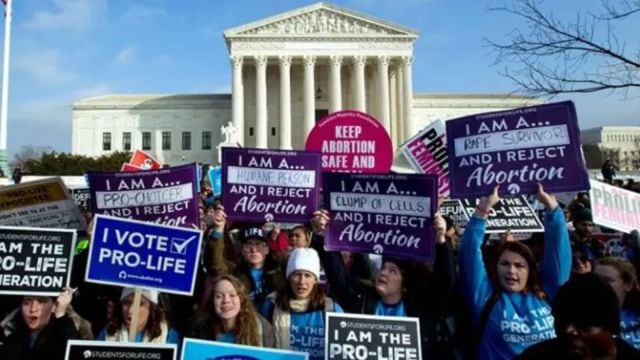Roe defeated, anti-abortion group shifts battle to UK
The group, Alliance Defending Freedom, has taken its playbook to Britain and has rapidly established itself as a power broker between the country’s rising populist movement and President Donald Trump’s Washington.
 Anti-abortion activists outside the US Supreme Court in Washington in 2019’s March for Life.(AP)
Anti-abortion activists outside the US Supreme Court in Washington in 2019’s March for Life.(AP) For nearly three hours, Nigel Farage, the leader of Britain’s once-fringe populist Reform UK Party, commanded an audience in Congress on Sept. 3 as he testified against his own country’s free-speech rules.
The presence of Farage, a longtime Trump ally, as the Republicans’ star witness in Washington was not merely a symbol of his growing political clout or the power of conservative populism.
Rather, it was the result of a discreet, monthslong campaign by one of America’s most influential conservative Christian groups, famous for being an architect of the effort that helped overturn Roe v. Wade and end the constitutional right to an abortion.
The group, Alliance Defending Freedom, has taken its playbook to Britain and has rapidly established itself as a power broker between the country’s rising populist movement and President Donald Trump’s Washington. They are catalyzing Reform UK, Britain’s fastest-growing political party that is seeking to upend the Conservative Party with an agenda centered on anti-establishment and anti-immigration sentiments. The ADF is guiding its leadership even further to the right, on a conservative Christian agenda similar to the one that is sweeping through the United States.
The ADF’s British arm orchestrated Farage’s appearance in Congress, reaching out to ask if he would like to give evidence on censorship and passing on his interest to the House Judiciary Committee, which formally invited him, according to both a Reform UK and a Republican official. An ADF lawyer testified alongside Farage in the hearing, together building a case against what they saw as growing government censorship in Europe. ADF officials have also quietly arranged briefings in Britain with visiting congressional leaders. They brokered a secret meeting between Farage and top State Department officials in London. And in private briefings, they have supplied the Trump administration with attack lines that cast the British government as hostile to free speech.
In Britain it is highly unusual for advocacy groups to hold influence the way they do in the United States.
In a statement, Paul Sapper, a spokesperson for ADF International — the global counterpart to its US operation — said that the group is “nonpolitically partisan” and has “engaged with every major political party in the UK” A Labour Party spokesperson, however, said there was no record of the ADF having any contact with the party.
Britain is, in many ways, an unlikely place for an American anti-abortion organization to build a base and leverage influence. Abortion rights hold overwhelming cross-partisan support and, unlike in the United States, religion plays little role in national politics.
But the ADF believes that British politicians, and the public, can be swayed and wants abortion rights to be rolled back, its lawyers said in an interview. More broadly, the group wants to empower conservative Christianity in Europe, and it sees Britain as a key bridgehead.
The ADF has begun its effort with a topic it believes will resonate with British voters: free speech. The group is spearheading an alliance of organizations that argues that Britain’s center-left government is too restrictive on political and religious speech.
“What’s emerging in the UK is a free-speech alliance of disparate groups who are all, for various reasons, shocked that we’ve ended up in the position we are here now,” Lorcán Price, a lawyer for the ADF who has been at the center of the group’s efforts in Britain, said in an interview.
The question of censorship has rocketed to the top of the political agenda in Britain this year. Groups on the right have raised alarms about the arrests of people who posted inflammatory anti-migrant messages online during riots last summer, while those on the left have criticized the arrests of hundreds of peaceful pro-Palestinian protesters under terrorism laws. In the United States, the assassination of conservative activist Charlie Kirk propelled the Trump administration to promise to punish people they accuse of hateful speech.
For the ADF, freedom of speech is intrinsically tied to religious freedom. Its task force of lawyers in Britain has challenged the prosecutions of Christians who were arrested for praying silently outside abortion clinics, and taken up the case of a student midwife who was suspended after making anti-abortion comments on social media. Abortion “buffer zones” — protected areas around clinics designed to prevent harassment — have been cited by conservative groups like the ADF to declare a free speech crisis in Britain.
Despite its growing presence in Britain, the ADF has remained relatively obscure, unlike in America, where it has grown powerful through high-profile Supreme Court cases that have carved out more space for Christianity in public life. The group has represented clients in the United States who are opposed to abortion, gay and transgender rights and contraception coverage in health care. Its allies include Vice President JD Vance and Rep. Mike Johnson, R-La., the speaker of the House, who is a former ADF lawyer.
Britain has no similarly prominent political figures who push for the Christian faith to have a central role in government. The ADF has cultivated an unlikely ally in Farage, who has previously described himself as a supporter of abortion rights and does not attend church.
As the ADF’s influence in Britain has grown since Trump’s reelection, Farage has suddenly started speaking out against abortion. The New York Times could find no previous record of him campaigning against abortion during his 31-year political career — in fact, in 2019, as the leader of the Brexit Party, Farage stated he had no official party stance on abortion. In November, he called for British lawmakers to debate rolling back the abortion limit. He went further in May, calling the current limit of 24 weeks “utterly ludicrous.”
Until now, public knowledge about the relationship between Reform UK and the ADF was limited to a single quote Farage gave to the group, which they pushed out in a press statement. But the ADF has quietly been courting the party since at least 2024.
When asked in a brief phone interview with the Times about his relationship with the ADF, Farage said that his party talks with “all sorts of groups.” He denied speaking against abortion, telling a reporter that she was “talking utter bollocks,” a crude British slang term for nonsense that he repeated six times.
He said that abortion was “No. 468” on Reform UK’s agenda and noted he had “hardly ever spoken about it in 30 years.”
For the ADF, the relationship with Farage appears to be a pragmatic one, similar to its dynamic with Trump. A disrupter with no consistent personal stance on abortion, Trump provided critical support for the ADF and its broader conservative Christian alliance to win their half-century-long campaign to topple Roe v. Wade.
“Our primary objective is to try and ensure that the human-rights framework applies as robustly as possible to Christians. And then the wider society,” Price said.
In the United States, the ADF worked with conservative lawmakers and strategically used the courts to eventually overthrow the right to abortion. But in England, abortion access is legislated through Parliament and cannot be overturned through a judicial decision.
To succeed in Britain, the ADF would have to adapt its playbook.
Since 2020, the ADF has quietly added more staff to its British operation. It increased the size of its team fourfold to 12 employees and quadrupled the money it sends to its British arm to more than 1 million pounds, or $1.35 million.
Its lawyers tried to get officials to notice free speech issues through clients it called “victims of censorship,” but were largely unsuccessful.
That changed at the Munich Security Conference in February, one of the biggest international stages in politics, when Vance used his platform to criticize an ally.
“In Britain, and across Europe, free speech, I fear, is in retreat,” he said. He highlighted the case of Adam Smith-Connor, an ADF client who had been convicted after silently praying within an abortion clinic buffer zone in southwest England.
Price, the ADF lawyer, privately credited the ADF for getting Vance to mention the case in his speech, according to two British and US officials he briefed. Price told the Times that he did not personally speak to anyone from Vance’s team and was “as surprised as anyone” by the mention in Munich.
Such a diplomatic and publicity win was important for the ADF. Drawing attention to cases like Smith-Connor’s is part of a long-term strategy to shift public opinion around abortion. In the United States, more than a decade ago, anti-abortion activists challenged similar buffer-zone laws as part of their long-term strategy to shift political discourse with the goal of rolling back abortion rights.
“The debate is in Parliament,” Price said. “And the parliamentarians are elected by the people, and so their priorities will only change when the public mood changes. And the public mood is changing.”
The ADF is also focusing its efforts on raising support on university campuses and social media platforms, like X, which can magnify fringe views. Price said that Elon Musk, X’s owner, has personally posted about some of ADF’s cases, and that X was amplifying the group’s concerns about Britain and freedom of speech in a “way that probably didn’t attract the same amount of attention in the past.”
It has achieved such success through deliberately framing its cases as being about protecting free speech, rather than restricting abortion.
Two days after testifying to Congress in Washington on Sept. 3, Farage was back in Britain for his first Reform UK party conference as leader, telling a rapturous audience in Birmingham, “We are the party on the rise.”
A British MAGA undercurrent ran through the event, as seen in the “Make Britain Great Again” baseball caps, and heard in Farage’s nationalistic speech, in which he railed against mass immigration, “society breakdown with law and order” and “sky high” taxes.
Farage made no mention of abortion, as he had in Congress, to his British audience. But he did attack the government for doing “everything they can to crush free speech online,” and claimed that Britain refuses “to acknowledge publicly the Judeo-Christian culture and heritage that we have and that underpins everything that we are.”
His words signaled that the inroads of the American Christian right are strengthening, both in and out of public view.





